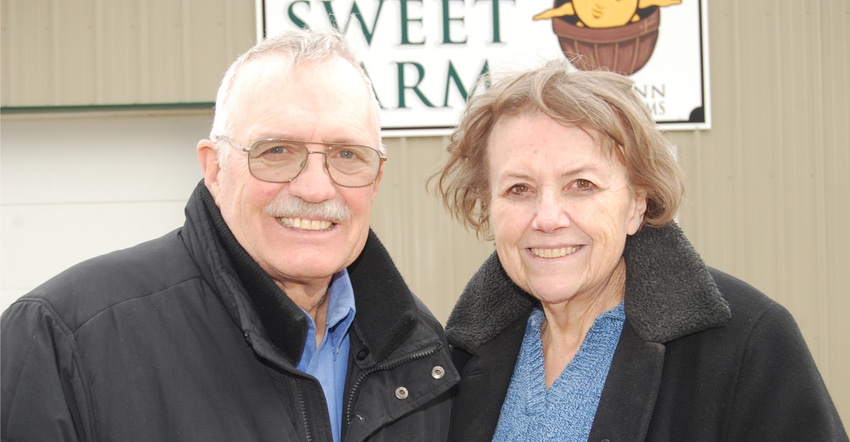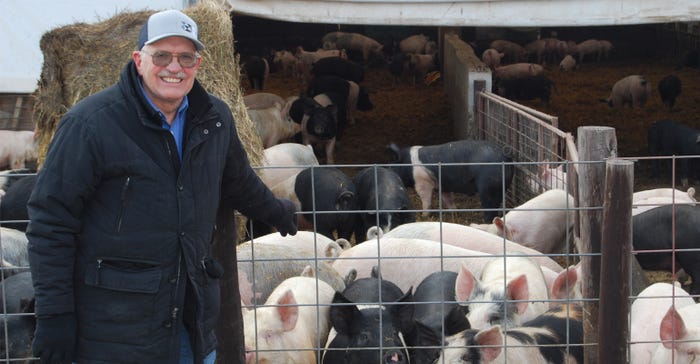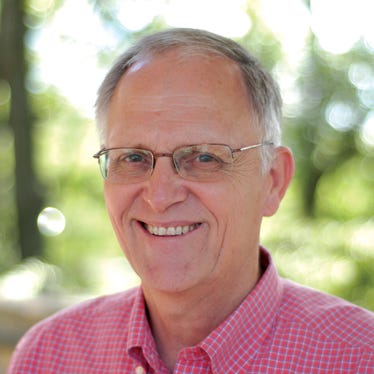March 4, 2020

After graduating from Iowa State University in 1973, Ron Rosmann returned to his parents’ farm near Harlan in western Iowa to take over the operation due to his father’s ill health. His parents asked for a one-year commitment. Forty-six years later, his interest in regenerative farming methods and his devotion to caring for the land remain strong.
Ron and wife Maria Vakulskas Rosmann were married in 1978, and together are the fourth generation of Rosmanns to farm the family’s land. Rosmann Family Farms is a 700-acre certified organic, diversified crop and livestock operation. It includes cattle, hogs, egg layers, a range of crops and Farm Sweet Farm, the on-farm store. Maria manages the store, selling food produced on Rosmann Family Farms along with other local products.
Their three sons — David, Daniel and Mark — grew up on the farm and are ISU graduates. Daniel and David farm with Ron and Maria. Living next door, Daniel and wife Ellen Walsh-Rosmann have their own enterprises of chickens and crops; own Milk and Honey, a restaurant in Harlan; and run FarmTable Delivery, a local food hub. David and wife Rebecka Tompkins-Rosmann live nearby in Avoca. And Mark, with wife Virginia Lehner, is an attaché for the USDA Foreign Ag Service, stationed in India.
Next generation
Nearing retirement, Ron and Maria are making progress on farm transfer plans. “Our main goal is to do it equitably. We also want to minimize the debt for David and Daniel when they take over completely,” Ron says.
Ron and Maria are an example of how to use practical management to make organic farming work. They’ve found a way to operate with diversification and marketing of a niche product — organic that is of higher value and more popular with consumers than ever before. They’re using these advantages to help bring the next generation into the farm operation.

ROSMANN MOTTO: “If there’s a good reason to do something differently that can make you more profitable as well as more environmentally sound, why not?” Ron asks.

Extensive records are kept on their USDA-certified organic farm. No pesticides are used. Crops have been certified organic since 1994, cattle since 1998 and hogs since 2002. Beef, pork and popcorn are sold with their private label to individual customers and grocery stores. Rosmann Family Farms organic meat and popcorn are also sold in Maria’s on-farm store.
“We have a crop and livestock operation with excellent yields, and we’re producing quality beef and pork. Our animals are healthy,” Ron says.
They’ve used deep-bed farrowing since 2003 and hoophouse farrowing since 2017. A manure management plan is followed, and they meet Global Animal Partnership standards through GAP and Organic Valley Co-op.
Ridge till has been used for corn and soybeans since 1984. Weeds are controlled with cultivation in 38-inch rows. Cover crops have been part of their system since 1989. Crop rotations include small grains, legumes and various cover crop species. Weeds are controlled with cultivation in 38-inch rows. All acres are farmed on the contour. Cover crops include winter rye, hairy vetch, radish, rapeseed and turnips. Small grains include oats, wheat, barley and field peas. They grow corn with no added nitrogen, other than N provided by manure and legumes. Half of the farm is in hay, pasture and small grains annually. All manure is composted to improve soil quality.
The beef herd is 110 Red Angus cows, calving some in spring and some in fall to better use rotational grazing. For finishing cattle, they use a small feedlot, a holding area and pasture grazing. Beef is marketed at 15 to 18 months, with pasture finishing and added grain to comply with USDA organic rules. For a herd of 45 sows, they use Swedish deep-bed methods, a hoop building and large barns with outdoor access, and a Cargill-type grower unit.
Practical Farmers of Iowa
There’s more labor involved with organic farming and specialty crops. What prompted Ron to get started with this and stay with it? In 1982, he met Dick and Sharon Thompson, co-founders of Practical Farmers of Iowa. This was before PFI was founded in 1985.
“The scientific validity of Dick’s on-farm research impressed me,” Ron says. “I listened, learned about ridge till and visited his farm. For weed control, his fields were cleaner than mine, and he wasn’t using herbicides.”
Learning about the Thompson farm influenced the Rosmanns to quit using chemicals the next year. “We went back to using herbicides a little bit in the early ’90s due to some weed control concerns,” Ron says. “Then in 1993, we received a USDA SARE [Sustainable Agriculture Research and Education] grant, and compared ridge till with and without herbicides on our farm. There was no yield difference between treatments, so we decided to do everything certified organic.”
Ron was vice president of the first PFI board in 1986 and remained active in PFI, serving on committees and hosting many field days over the years. “Our goal with PFI was to conserve our natural resources, do less harm to the environment and maintain our bottom line,” he says. “PFI began with farmers doing on-farm research as the heart of the organization. That’s still true today. PFI has impacted everything about how we farm. We’ve gotten answers to whether something can work, thanks to on-farm research. We gained the courage to make changes by learning from the experience of other farmers.”
Letters of support for Ron and Maria’s nomination for the Iowa Master Farmer Award cite their involvement as longtime volunteers in their community. Ron was a 4-H leader and served on the Shelby County Extension Council. He served as chair of the REAP committee for the county. He was named a Master Researcher by PFI for hosting over 40 field trials on the farm from 1988 to present. Ron and Maria are active in their church, St. Boniface, at Westphalia. Ron has served as board member of the National Catholic Rural Life Conference, Leopold Center Visioning Task Force and the Organic Farming Research Foundation.
About the Author(s)
You May Also Like






